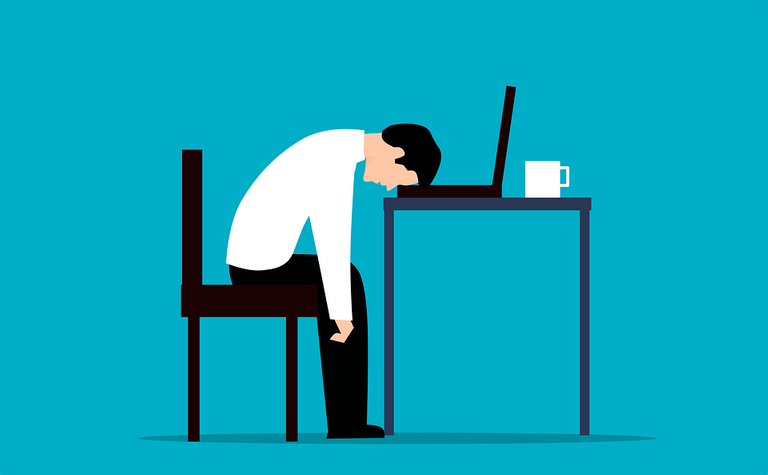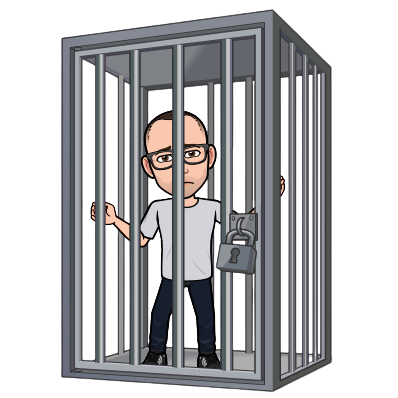ENGLISH VERSION
Is chronic procrastination simply a personality flaw or an addiction to be overcome?
Translation courtesy of DeepL
Hi guys, good morning, during the course of this morning (the morning of Wednesday, June 29, the day I started writing) several little things happened that made me have the reflection that gave name to the title of this quick (but long) writing.
To give you some context before continuing, I will give you the definition of a key word in the whole story and some characteristics to understand it: procrastination.
Procrastinate Source
To keep delaying something that must be done, often because it is unpleasant or boring.
Although probably everyone has done it or at least most people at some point in their lives have procrastinated for some personal reason, what I will tell here has to do with my experience and chronic procrastination.
PS: half of this writing I did in a couple of hours and the other half including the research on the topic on the internet I did about 12 hours after I started. The posting on Hive was done more than 80 hours after I started writing it even though I wanted to do it the same day I came up with the topic, all because I was procrastinating.
PROCRASTINATION View on Wikipedia
Note: These quotes were taken from an article on "procrastination" from the Spanish Wikipedia, if you wish to consult an article in English, please click here.
Procrastination (from the Latin procrastinare: pro, ahead, and crastinus, tomorrow), procrastination or postponement is the action or habit of delaying activities or situations that should be attended to, replacing them with other more irrelevant or pleasant situations for fear of facing them and/or laziness to carry them out.
It is a volitional behavioral disorder rooted in the association of the action to be performed with change, pain or discomfort (stress). Stress can be psychological (in the form of anxiety or frustration), physical (such as that experienced during acts requiring hard work or strenuous exercise) or intellectual. The term is commonly applied to the sense of anxiety generated in the face of a pending task without having the willpower to complete it. The act that is postponed may be perceived as overwhelming, challenging, unsettling, dangerous, difficult, tedious or boring, i.e., stressful, so it is self-justified to postpone it to an idealized sine die future, in which the important is subordinated to the urgent, i.e., if something is not urgent, the person downplays its importance and does not do it. (italics mine).

SOME FEATURES View on Wikipedia
Procrastination is seen as a moral problem. Procrastinators are often characterized as lazy, lazy, lacking in ambition, especially in goal-oriented societies where leisure is frowned upon.
As a syndrome that avoids taking responsibility by postponing tasks, it can lead the individual to take refuge in activities unrelated to his or her duties.
This health problem is not necessarily linked to depression or low self-esteem. Extreme perfectionism or fear of failure are also factors for procrastination (e.g. not attending a phone call or an appointment where a decision is expected to be reached).
There are two types of individuals who perform this action:
Eventual procrastinators, whose evasive attitude is not habitually repeated.
Chronic procrastinators, whose avoidance behavior is constant and repeated over time.
The latter are those that commonly denote disorders in the aforementioned behaviors.
If I tried to put it in my own words, I would say that when I procrastinate I feel that I "waste time without necessarily wasting it", but it is just a feeling, it is not a reality. That is, I waste the time I had planned to spend on something important, while at the same time, I use it on something else that for me and only for me is useful, such as reading news of any kind, doing mathematical accounts, and so on.
It should also be made clear that procrastinating is probably not considered a disease per se, but those of us who consciously - or in some cases even unconsciously - procrastinate chronically suffer for doing so, according to an article published in The New York Times entitled "Procrastination Is Not a Matter of Laziness, but of Managing Emotions" under the subtopic "If Procrastination Isn't Laziness, Then What Is It About?" it can be said that:
"Etymologically, "procrastination" derives from the Latin verb procrastināre, to put off until tomorrow. However, it is more than willful procrastination. Procrastination also derives from the Ancient Greek word akrasia, doing something against our better judgment.
"It's hurting yourself," said Piers Steel, a professor of Motivational Psychology at the University of Calgary and the author of The Procrastination Equation: How to Stop Putting Things Off and Start Getting Stuff Done.
That self-awareness is a key piece in understanding why procrastinating makes us feel bad. When we procrastinate, we're not only aware that we're avoiding the task at hand, but also that doing it is probably a bad idea. And yet, we do it anyway."
Now what I am going to tell you -as I said it happened in the morning (Wednesday) - is something that for some people may be an isolated event or a simple episode in their lives, but for a chronic procrastinator is a story that repeats itself no matter the time.... Be it morning, afternoon or evening this happens day after day, it is something that if left unchecked results in total chaos, by this I don't mean the story itself, but its essence, the fact of procrastinating specifically, for whatever reason, I mean "using the time scheduled for something important on something else less important or on something that was not scheduled for that specific time".

¡The story...!
Today (that day) I woke up at approximately 06:30 am like any other day (when I could do it after waking up, since I can remember I always have trouble getting up, to be honest), I had to get ready to go out with my wife, come back to eat something and prepare some information I needed to understand before going to a meeting I had scheduled for the afternoon.
While I was still drowsy I got distracted reviewing the reward of my presentation - my first post-, because I want to understand the workings of the system (it is in situations like this among others that I get the feeling of being an OCD person - as I discussed in my presentation- since I feel I have no control of things while I don't understand them and I become quite annoying for me and for those around me in person or virtually and I don't rest until the issue is finally solved, no matter how insignificant it is, it always happens to me when I don't understand something and I want to understand it at that moment, I feel I must keep researching, asking and learning until I manage to master the theory and practice so I can continue with my life peacefully). I made the claim yesterday (the day before Wednesday) in the afternoon/evening and didn't pay more attention to it, but I did make a comment in the Spanish Telegram group before disconnecting, saying that I did not understand what had happened and when I woke up as I had a notification I started to read the messages and ask questions a little incomprehensible because of my hasty reaction to the situation while at the same time I was doing mental calculations or in the calculator of my cell phone to see if I could somehow find a logical explanation to what did not fit in all that or at least for me it did not fit, searching without rest and without the desired results.

This made me late to accompany my wife who was trying to leave early to do some exercise, something she rarely achieves, many times thanks to me, for example that day we left an hour late and in fact I can say that I went out with her and I was present body on the court while she did her exercise routine, but my mind did not stop looking for any idea that would solve the problem that I had posed and kept asking questions in the Telegram group.
Back at home I was still looking for a logical explanation to the difference between the reward I received and the one I expected to receive (I must say that I thought that the reward would be a lower amount than the one I received, at least in the amount of HP assigned to the publication, since the price of Hive increased those days before the claim, this was the difference -incidentally- that caused all this odyssey).

To finish the task I set myself, to solve it as soon as possible to continue with my normal day, I continued investigating, because the task had already "become" (or rather, "I" had turned it) into a titanic task, I was surfing the internet without success until finally, after several people dealt with the intensity and insistence of my questions, after several people dealt with the intensity and insistence of my questions and after more than 4 hours I could have breakfast "calmly" knowing that I had the solution at hand thanks to the intervention of a person who explained that when the price of the Hive varies, the rewards system is not updated automatically or instantaneously, but rather it is an adjustment of the last 3.5 days prior to the claim, which coincided more with the calculations I had made.
After lunch I kept checking the calculations and it occurred to me to sit down to write this post, I also had a couple of things to check on the pc, I also started to read a news that caught my attention, I got distracted with other information and when I looked at the time again 3 more hours had passed, it was already one o'clock in the afternoon (01:00 pm). Then because of all the mental and physical tiredness I had I fell asleep and woke up at 3pm, surprise, I only had 01 hour left to get ready and leave the house again, late again.

Now you may ask, what's the problem with all this? Besides being late twice.
As I already mentioned, it is possible that this type of situation happens only once in the life of any person or at least once a year, but we are not talking about something that happens once a year or a month, but something that happens daily in the life of a procrastinator, so as you can imagine it is not only a situation that happens daily, but it was not precisely what I had planned to do during the day.
Consequences of procrastination.
Let's see, we have already read that procrastinating is "harming oneself", but how is this possible? How is it understood in real life?
Well, at the beginning of the story I told you that I had planned to accompany my wife, prepare some information and attend a meeting in the afternoon.
When I allowed something else to distract my attention from what was important and systematically put off every single thing I was supposed to do, I caused myself many problems during the day. Such as:
- My wife and I went out late to exercise and therefore had a late breakfast.
- I made my wife feel lonely even though I was right next to her.
- Both distraction and tiredness prevented me from being able to read the information I needed in time and in the end I couldn't understand it well enough either.
- I was late for my meeting.
- I couldn't even finish this writing when I set out to make it short, brief, concise and quick and by the time I sat back down to finish it, it was too late and we had to sleep, so even though I set out to publish it the same day, I couldn't even do it in the next two days.
- In addition, I again put off for another day some writing that I have unfinished since I did my presentation or even before that, both for posting on Hive and for me personally.

As my dear wife and best friend would tell me when she sees me procrastinating quoting "Guy" from the movie "The Croods": "This is absurd, we are running out of time, everything is falling apart, you are irrational and unproductive". It sounds a bit comical, but that's the reality, I know it's irrational and unproductive, but I still do it.
Reflections...!
Another thing that happened that day was that someone in the Telegram group said as a joke (I hope so) or in a very serious way to stop asking and go write more Hive posts since my first and last post was my presentation since it was already 8 days ago by that time, actually I already have almost 10 topics I want to write about, pending ideas to develop, but it requires a lot of effort and concentration on my part to write sometimes 1 or 2 paragraphs and it's a lot.
This makes me remember how in my adolescence or as an adult many people have told me "you have to try harder", but they do not know how much effort I make to do what I do, although for them it seems very little, for me it is an achievement that they do not value and often I do not value either.
Of course, even I have accused myself of being a lazy person because I have heard it so many times and only a few months ago I discovered that the term "procrastination" exists and that there is a probability that I am a procrastination addict.

But do others know the level of concentration required to do a task when you find it easy to get distracted? Or when you are afraid of failing at it? Do they know the anguish, anxiety and stress of having to start and especially finish an important task? Doing it without knowing how to control emotions, feelings and negative thoughts that originate in the course of time and that gets worse when insecurity and fear of failure feel so real that it is as if you have already failed.
Now, the problem of procrastinating lies in the fact that procrastinating is no longer an occasional thing to become a priority, because we do it not once but repeatedly, leaving aside what causes all this accumulation of emotions and mixed feelings to do something of less importance and even more satisfying, thus giving a momentary sense of relief and pleasure, which is then clearly interrupted by the fact of returning to reality, there is still an important task pending to do, then we put it off again to feel relieved and we turn this into a vicious circle.
So much so, that in my case I feel that it is a problem that turns into an addiction, therefore it does not seem that it can be solved without seeking help from those around us and even from experts on the subject if necessary, to help us devise a plan of action with their respective plan B, C, D, E and Z if necessary, E and Z if necessary and to give us a hand to fulfill that plan of action, to carry out practical ways to break that circle, as if to break the chains of a dungeon in order to escape, to change habits and behaviors until we manage to have control of our actions and not that habits and actions control our life.

When those thoughts of failure and uselessness come to us we must let them go, let's not dwell on them, let's not overlook the feelings of frustration, anxiety, stress and other emotions that make us want to not do something, let's talk to someone we trust and look for the strength, courage and motivation to do the most important things in our lives.
If you have read this far, I thank you very much for taking some of your valuable time to read my writing and I hope it will be useful to you or someone close to you who is going through a similar situation. This story is based entirely on a true event in my life and should not be used under any circumstances without my prior consent.
VERSIÓN EN ESPAÑOL
La procrastinación crónica es un simple defecto en la personalidad o una adicción a la que hay que vencer?
Hola chicos, buen día, durante el transcurso de esta mañana (la mañana del miércoles 29 de junio, día en el que comencé a escribir) ocurrieron varias cosillas que me hicieron tener la reflexión que dio nombre al título de este rápido (pero largo) escrito.
Para darles un poco de contexto antes de continuar les daré la definición de una palabra clave en todo el relato y algunas características para poder entenderlo: procrastinación.
PROCRASTINAR Fuente RAE
Del lat. procrastināre. 1. tr. Diferir, aplazar.
Aunque probablemente todas las personas lo han hecho o al menos la mayoría en algún momento de sus vidas ha procrastinado por alguna razón personal, lo que contaré acá tiene que ver con mi experiencia y la procrastinación crónica.
PD: la mitad de este escrito la realicé en un par de horas y la otra mitad incluyendo la investigación sobre el tema en internet la hice unas 12 horas después de haber empezado. La publicación en Hive la hice más de 80 horas después de que empecé a escribirla a pesar de que deseaba hacerlo el mismo día que se me ocurrió el tema, todo por estar procrastinando.
PROCRASTINACIÓN Ver en Wikipedia
La procrastinación (del latín procrastinare: pro, adelante, y crastinus, mañana), postergación o posposición es la acción o hábito de retrasar actividades o situaciones que deben atenderse, sustituyéndolas por otras situaciones más irrelevantes o agradables por miedo a afrontarlas y/o pereza a realizarlas.
Trata de un trastorno volitivo del comportamiento que tiene su raíz en la asociación de la acción por realizar con el cambio, el dolor o la incomodidad (estrés). Este puede ser psicológico (en la forma de ansiedad o frustración), físico (como el que se experimenta durante actos que requieren trabajo fuerte o ejercicio vigoroso) o intelectual. El término se aplica comúnmente al sentido de ansiedad generado ante una tarea pendiente sin tener una fuerza de voluntad para concluirla. El acto que se pospone puede ser percibido como abrumador, desafiante, inquietante, peligroso, difícil, tedioso o aburrido, es decir, estresante, por lo cual se autojustifica posponerlo a un futuro sine die idealizado, en que lo importante es supeditado a lo urgente, es decir, si algo no es urgente la persona le resta importancia y no lo hace (las cursivas son mías).

ALGUNAS CARACTERÍSTICAS Ver en Wikipedia
La procrastinación es vista como un problema moral. A menudo se caracteriza a quien procrastina como holgazanes, flojos, faltos de ambición, en especial en las sociedades orientadas al logro de objetivos, en la que el ocio es mal visto.
Como síndrome que evade el responsabilizarse posponiendo tareas, puede llevar al individuo a refugiarse en actividades ajenas a su cometido.
Este problema de salud no necesariamente está ligado a la depresión o a la baja autoestima. El perfeccionismo extremo o el miedo al fracaso también son factores para posponer (por ejemplo: al no atender una llamada o una cita donde se espera llegar a una decisión).
Existen dos tipos de individuos que ejecutan esta acción:
- Procrastinadores eventuales, cuya actitud evasiva no se repite habitualmente.
- Procrastinadores crónicos, cuya conducta evasiva es constante y repetida en el tiempo.
Los segundos son los que comúnmente denotan trastornos en los comportamientos antes mencionados.
Si intentara decirlo con mis propias palabras, diría que cuando procrastino siento que "pierdo el tiempo sin perderlo necesariamente", pero es sólo una sensación, no es una realidad. Es decir, pierdo el tiempo que había planeado dedicarle a algo importante, mientras que al mismo tiempo, lo uso en otra cosa que para mí y sólo para mí es útil, como por ejemplo leer noticias de cualquier tipo, hacer cuentas matemáticas, etc.
Hay que aclarar también que el hecho de postergar las cosas probablemente no sea considerado una enfermedad en sí, pero quienes procrastinamos consciente -o en algunos casos incluso inconscientemente- de forma crónica sufrimos por hacerlo, según un artículo publicado en The New York Times titulado “Procrastinar no es un asunto de holgazanería, sino de manejo de las emociones” bajo el subtema “Si la procrastinación no es flojera, entonces, ¿de qué se trata?” se puede decir que:
“Etimológicamente, “procrastinación” deriva del verbo en latín procrastināre, postergar hasta mañana. Sin embargo, es más que postergar voluntariamente. La procrastinación también deriva de la palabra del griego antiguo akrasia, hacer algo en contra de nuestro mejor juicio.
“Es hacerse daño a uno mismo”, dijo Piers Steel, un profesor de Psicología Motivacional en la Universidad de Calgary y el autor de The Procrastination Equation: How to Stop Putting Things Off and Start Getting Stuff Done.
Esa autoconciencia es una pieza clave para entender por qué procrastinar nos hace sentir mal. Cuando procrastinamos, no solo estamos conscientes de que estamos evadiendo la tarea en cuestión, sino también de que hacerlo es probablemente una mala idea. Y aun así, lo hacemos de todas maneras.”
Ahora lo que voy a contarles -como dije sucedió en la mañana (del miércoles)- es algo que para algunas personas puede ser un hecho aislado o un simple episodio en sus vidas, pero para un procrastinador crónico es una historia que se repite sin importar la hora… Sea mañana, tarde o noche esto ocurre día tras día, es algo que si no se controla resulta en un caos total, con esto no me refiero a la historia en sí, sino a su esencia, al hecho de procrastinar específicamente, sea por el motivo que sea, me refiero a “usar el tiempo programado para algo importante en otra cosa menos importante o en algo que no estaba programado para ese momento específico”.

¡La historia...!
Hoy (ese día) me levanté aproximadamente a las 06:30 am como cualquier otro día (cuando pude hacerlo después de despertarme, ya que desde que tengo uso de razón siempre me cuesta levantarme, para ser honesto), debía arreglarme para salir con mi esposa, volver para comer algo y dedicarme a preparar una información que necesitaba entender antes de ir a una reunión que tenía prevista para la tarde.
Mientras todavía estaba somnoliento me distraje revisando la recompensa de mi presentación -mi primer post-, porque quiero entender el funcionamiento del sistema (es en situaciones como ésta entre otras que tengo la sensación de ser una persona con TOC -como comenté en mi presentación- ya que siento que no tengo control de las cosas mientras que no las entiendo y me vuelvo bastante molesto para mí y para quienes me rodean en persona o virtualmente y no descanso hasta que el asunto por fin quede resuelto, por muy insignificante que sea, siempre me pasa cuando no entiendo algo y quiero entenderlo en ese momento, siento que debo seguir investigando, preguntando y aprendiendo hasta que logre dominar la teoría y la práctica para poder continuar con mi vida tranquilamente). Hice el claim ayer (el día anterior al miércoles) en la tarde/noche y no le presté más atención, pero sí hice un comentario en el grupo de Telegram en español antes de desconectarme, diciendo que no entendía qué había pasado y al despertar como tenía una notificación me puse a leer los mensajes y a hacer preguntas un poco inentendibles por lo apresurado de mi reacción a la situación mientras que al mismo tiempo hacía cálculos mentales o en el calculadora del celular para ver si lograba encontrar de alguna forma una explicación lógica a lo que no encajaba en todo eso o al menos para mí no encajaba, buscando sin descanso y sin los resultados deseados.

Esto hizo que me retrasara para acompañar a mi esposa quien intentaba salir temprano a hacer algo de ejercicio, cosa que pocas veces logra, muchas veces gracias a mi, por ejemplo ese día salimos una hora tarde y de hecho puedo decir que salí con ella y me encontraba de cuerpo presente en la cancha mientras ella hacía su rutina de ejercicios, pero mi mente no dejaba de buscar alguna idea que resolviera el problema que me había planteado y seguía haciendo preguntas en el grupo de Telegram.
Ya de regreso en casa seguía buscando una explicación lógica a la diferencia que para mí existía entre la recompensa recibida y la que esperaba recibir (debo decir que pensé que la recompensa sería una cantidad inferior a la que recibí, al menos en el monto de HP asignado a la publicación ya que el precio de Hive aumentó esos días antes de el claim, esta fue la diferencia -dicho sea, de paso- causante de toda esta odisea).

Para finalizar la tarea que me impuse, de resolver eso tan pronto como fuese posible para proseguir con mi jornada normal en el día, seguí investigando, pues ya la tarea “se” había convertido (o mejor dicho, “yo” la había convertido) en una labor titánica, estuve navegando en internet sin éxito hasta que por fin, luego de que varias personas lidiaran con la intensidad e insistencia de mis preguntas y ya pasadas más de 4 horas pude desayunar “tranquilamente” sabiendo que tenía la solución a la mano gracias a la intervención de una persona que explicó que cuando varía el precio del Hive no se actualiza automático ni instantáneo el sistema de rewards, sino más bien es un ajuste de los últimos 3,5 días previos al claim, lo cual coincidía más con los cálculos que había hecho.
Luego de comer seguí revisando los cálculos y se me ocurrió sentarme a escribir este post, además tenía un par de cosas pendientes por revisar en la pc, también me puse a leer una noticia que llamó mi atención, me distraje con otra información y cuando volví a ver la hora habían pasado 3 horas más, ya era la una de la tarde (01:00 pm). Luego por todo el cansancio mental y físico que tenía me quedé dormido y me desperté a las 3pm, sorpresa, sólo me quedaba 01 hora para arreglarme y volver a salir de casa, tarde nuevamente.

Ahora se preguntarán, cuál es el problema de todo esto? Además de haber salido tarde dos veces.
Pues como ya mencioné es posible que este tipo de situaciones ocurran sólo una vez en la vida de cualquier persona o al menos una vez al año, pero no estamos hablando de algo que ocurre una vez al año o al mes, sino de algo que pasa diariamente en la vida de un procrastinador, entonces como es de suponer no sólo es una situación que pasa a diario, sino que no era eso precisamente lo que tenía planeado para realizar durante el día.
Consecuencias de haber procrastinado.
Veamos, ya leímos que procrastinar es “hacerse daño a uno mismo”, pero ¿cómo es esto posible? ¿Cómo se entiende en la práctica?
Bueno, empezando el relato les comenté que tenía planeado acompañar a mi esposa, preparar una información y asistir a una reunión en la tarde.
Cuando permití que otra cosa distrajera mi atención de lo importante y sistemáticamente postergué cada una de las cosas que debía realizar, yo mismo me causé muchos problemas durante el día. Tales como:
- Mi esposa y yo salimos tarde a hacer ejercicio y por ende desayunamos tarde.
- Hice que mi esposa se sintiera sola a pesar de estar junto a ella.
- Tanto la distracción como el cansancio evitaron que pudiera leer la información que necesitaba a tiempo y al final tampoco pude entenderla lo suficientemente bien.
- Llegué tarde a mi reunión.
- Ni siquiera pude terminar este escrito cuando me propuse hacerlo corto, breve, conciso y rápido y para cuando me volví a sentar a terminarlo era muy tarde y debíamos dormir, así que a pesar de que me propuse publicarlo el mismo día, ni siquiera pude hacerlo en los dos días siguientes.
- Además, volví a dejar para otro día algunos escritos que tengo sin terminar desde que hice mi presentación o incluso antes de eso, tanto para publicar en Hive como para mí personalmente.

Como me diría mi querida esposa y mi mejor amiga cuando me ve procrastinando citando a "Guy" de la peli "Los croods": "Esto es absurdo, se nos acaba el tiempo, todo se derrumba, eres irracional y poco productivo". Suena un poco cómico, pero esa es la realidad, sé que es irracional y poco productivo, pero aún así lo hago.
¡Reflexiones...!
Otra cosa que pasó ese día fue que alguien en el grupo de Telegram dijo como un chiste (eso espero) o de forma muy seria que dejara de preguntar y me fuera a escribir más posts de Hive ya que mi primera y última publicación era mi presentación desde hacía ya 8 días para ese momento, en realidad ya tengo casi 10 temas sobre los que quiero escribir, ideas pendientes por desarrollar, pero requiere mucho esfuerzo y concentración de mi parte para escribir a veces 1 o 2 párrafos y es mucho.
Esto me hace recordar cómo en mi adolescencia o ya de adulto muchas personas me han dicho “tienes que esforzarte más”, pero no saben cuánto me esfuerzo para hacer lo que hago, aunque para ellos parezca muy poco, para mi es todo un logro que no valoran y muchas veces yo tampoco valoro.
Claro, es que hasta yo mismo me he acusado de ser una persona floja por las tantas veces que lo he escuchado y que apenas hace unos pocos meses descubrí que existe el término "procrastinación" y que existe una probabilidad de que yo sea un adicto a procrastinar.

Pero ¿saben los demás el nivel de concentración que se requiere para hacer una tarea cuando te resulta fácil distraerte? ¿O cuando tienes miedo a fracasar haciéndola? ¿Conocen ellos la angustia, ansiedad y estrés que causa tener que empezar y sobre todo terminar una tarea importante? Hacerlo sin saber controlar las emociones, los sentimientos y los pensamientos negativos que se originan en el transcurso del tiempo y eso empeora cuando la inseguridad y el miedo al fracaso se sienten tan reales que es como si ya se hubiera fracasado.
Ahora bien, el problema de procrastinar radica es en que postergar las cosas deja de ser ocasional para convertirse en prioridad, porque no lo hacemos una sino repetidas veces, dejando de lado lo que causa todo este cúmulo de emociones y sentimientos encontrados por hacer algo de menor importancia y hasta más satisfactoria, dando así una momentánea sensación de alivio y placer, que luego se ve claramente interrumpida por el hecho de volver a la realidad, todavía hay una tarea importante pendiente por hacer, entonces la volvemos a postergar para sentirnos aliviados y convertimos esto en un círculo vicioso.
Tanto es así, que en mi caso siento que es un problema que se torna como ya dije en adicción, por tanto no parece que pueda solucionarse sin que busquemos ayuda de quienes nos rodean y hasta de expertos en el tema si hace falta, que nos ayuden a idear un plan de acción con su respectivo plan B, C, D, E y Z si es necesario y que nos den una mano para cumplir con ese plan de acción, para llevar a cabo formas prácticas de romper ese círculo, como si de romper las cadenas de un calabozo se tratase para poder escapar, cambiar hábitos y conductas hasta que logremos tener el control de nuestras acciones y no que los hábitos y las acciones controlen nuestra vida.

Cuando nos lleguen esos pensamientos de fracaso e inutilidad debemos dejarlos ir, no nos quedemos dando vueltas en ellos, tampoco pasemos por alto los sentimientos de frustración, ansiedad, estrés y demás emociones que nos hagan desear no hacer algo, hablemos con alguien de confianza y busquemos la fuerza, el valor y la motivación para hacer las cosas más importantes de nuestras vidas.
Si has leído hasta aquí, te agradezco muchísimo que usaras parte de tu valioso tiempo para leer mi escrito y espero que logre ser de utilidad para ti o alguien cercano a ti que esté pasando una situación similar. Esta historia está basada totalmente en un hecho real de mi vida y no debe ser usada bajo ninguna circunstancia sin previo consentimiento de mi parte.
@juantirado, thank you for supporting the HiveBuzz project by voting for our witness.
Click on the badge to view your Board of Honor.
Once again, thanks for your support!
Hello.
The account is now verified:
https://hivewatchers.com/verifications?utf8=%E2%9C%93&verification%5Busername_search%5D=juantirado
Thank you.